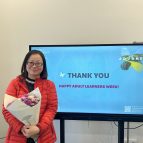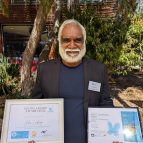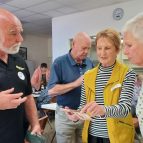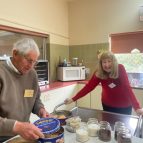Jump starting literacy
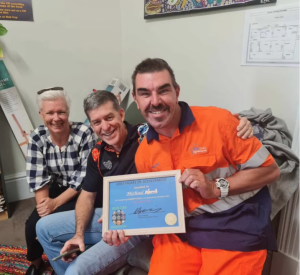
A volunteer run program in Geraldton WA is helping men to improve their literacy.
When he’s not working at Geraldton’s Greenough Regional Prison, literacy teacher Wayne Hosking spends his Wednesday afternoons working as a volunteer tutor in a local community centre.
Started in July 2022 at Centacare Men’s Hub, Hub Cap is a free adult literacy program for men, many of whom have spent their lives hiding their struggles with reading and writing.
There’s no shortage of guys in Geraldton and the surrounding area wanting help, Wayne says. ‘I’m often working with guys who don’t know the alphabet and have zero literacy.
Some are rough-sleeping around town, some come to us through the justice system, others find us through word of mouth.’
They’ve reached adulthood with such low levels of literacy for a range of reasons, including childhood illnesses that have disrupted their schooling, undiagnosed learning disabilities, or bullying that made school a place not conducive to learning.
All of them have been really harmed by their low literacy, Wayne says. Taking the first step to get help is a milestone so Wayne makes sure they feel welcomed and safe in an environment that’s as unlike school as possible.
‘Their negative memories of school are still strong so we keep things informal and low key.’
‘Many of the guys I work with aren’t going to get a job or go to uni but they have a greater sense of self-worth and autonomy and they’re able to do things they haven’t been able to do before, and function better in everyday life. And that’s huge.’ Wayne Hosking, Hub Cap literacy tutor
There’s no whiteboards, no complicated enrolment forms, and the classroom looks more like a comfortable loungeroom. ‘We sit around drinking coffee and talking BS and I do whatever I can to make it easy for them. If we need to pick them up, drop them home, have a yarn, bring them in a feed, we do whatever’s required. That sort of thing doesn’t and can’t happen in formal settings and most of them would find somewhere like TAFE just too daunting.
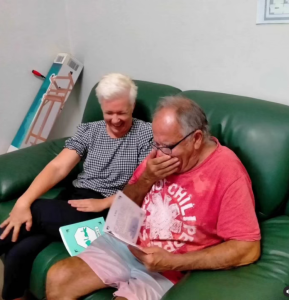
‘It’s not like school where attendance is mandatory. As adults they only come if they want to. If they come in and feel uncomfortable they don’t come back. So I make sure they are happy and it’s enjoyable and they can see progress. Sometimes there might be more coffee and talking than studying, it just depends.’
But Wayne says once they start the men are keen to make progress. ‘When they are ready to come in and get help they do wonderfully well.
‘The centre is open during business hours so even if I’m not here, the guys can come in and work at their own pace, on their own. It gives them a sense of autonomy and a feeling that they are in control of their own learning. One of the guys, Malcolm, practically lives here, he’s a study machine. I might drop in and give him a rev up and say “Well done”, but he’s very self-directed and very motivated. Having said that, one-on-one reading together is still the gold standard, and I try and do at least one or two sessions a week with each student.’
In the room next door fellow volunteer Kerrie Elliott runs art classes and the two groups mingle at break times. ‘Everyone gets to know one another and it’s a little community. It’s a really welcoming group,’ Wayne says.
Doing art with Kerrie encourages self-expression and creativity and can be a stepping stone to getting help with reading and writing, Wayne says.
‘It can be a great hook to get them into the literacy class. They might sit in the art sessions for a while with Kerrie, but they get to know me as well. It’s another way we can break down barriers of shame or hesitancy. Maybe when we’re yarning about something I’ll just ask “How’s your reading, mate” and they’ll tell me: “Good enough” or “Nah, no good” and we can take it from there.
‘It’s a matter of being here whenever someone reaches a stage where they’re ready to have another go, and then to meet their specific needs as much as possible.
‘We have no formal program, I just work one-on-one and I have great funders who give me the flexibility so that each individual student is the centre of our attention, it’s all about them.’
‘I love working with these guys and the challenge of thinking about and solving problems and I like to learn and listen to people. That’s a trait that’s universally useful.’ Wayne Hosking, Hub Cap literacy tutor
Countering the shame of low literacy
‘All of the guys have got a story. Working in prison you get familiar with the barrier of shame. Some of them have never been encouraged or received positive feedback regarding education in their lives. So when they come in here it might be the first time they’ve had positive messages about their ability to read or write.
‘One guy I’m working with nearly fell off his chair when I said his writing was fantastic. He was terribly selfconscious about his handwriting but my standard isn’t about how the writing looks, it’s just whether it’s legible. If I can read back to them what they wrote, then their writing is fine: that’s the purpose of writing isn’t it? To communicate? Me reading back to him something he’d written was the first time anyone had said anything good about his academic abilities and he is 60 years old. That has a huge impact.
‘The same happens when someone who can’t read a word sits and reads a small book for the first time. It makes them reassess where they think they’re at and it changes their view of themselves. For someone who believes they can’t read to be half an hour later reading a simple book makes them reassess their whole sense of self and what they are capable of.
‘I’ve had men record themselves reading to a child that they are separated from. The whole family ended up listening to the recording because they didn’t believe he could read. I’ve seen men start reading for pleasure for the first time, and others have told me they answered a couple of questions when watching TV quiz shows because they learned facts during our reading practice. They will open their own mail now. One bloke had never touched a computer before. We showed him how to use the mouse so he could work with some of our literacy software. So now he’s purchased his first smart-phone, aged 58.
‘One guy who had untreated hearing loss as a kid and really missed out in school is reading really well. After about six months of learning, he picked up a book of junior fiction and three hours later had read 100 pages. Half way through he looked up and said, “I can see pictures in my head!” Seeing him discover the joy of reading for the first time was fantastic. What’s that worth?’

From CEO to adult literacy tutor
Wayne didn’t start his teaching career until later in life. A science graduate who started work as a research officer for a fisherman’s co-operative, he later took over as CEO and over 16 years oversaw its development into the world’s largest lobster export company with a half a billion dollar turnover. In 2018, he quit his job and retrained as an adult literacy teacher and began work at the local prison. But helping people improve their reading and writing had always been at the back of his mind.
‘When I first came to Geraldton 30 years ago, I went to the ATM to withdraw some cash. I was waiting in line behind a bloke. He was taking a long time. He was pushing buttons, starting to get agitated. Eventually I looked over his shoulder and there was a big red sign saying “Out of order”. I said, “That’s not working mate” and he dropped his head and walked off. That’s when I decided I would one day work on adult literacy. I started studying for my Grad Dip as soon as I resigned in 2018.
‘I’ve always been someone who loves a challenge and when I see a problem I like to fix it. I first became aware of low literacy among the seasonal fish factory workers here in Geraldton when I was CEO and I got interested in what to do about it.
‘Centacare have been really supportive. It’s something a bit different for them, but they have really embraced and supported us and it’s very compatible with other things they are doing in the Men’s Hub.
‘The model we’ve built here it’s really low cost. We run on the smell of an oily rag because otherwise it’s not sustainable. I’m about to go back to the well for more funding for another year. Our main supporters are Bendigo Bank and the local Rotary club. They’re really happy with what we’re doing.’
Read the full issue of Quest 2, 2023


